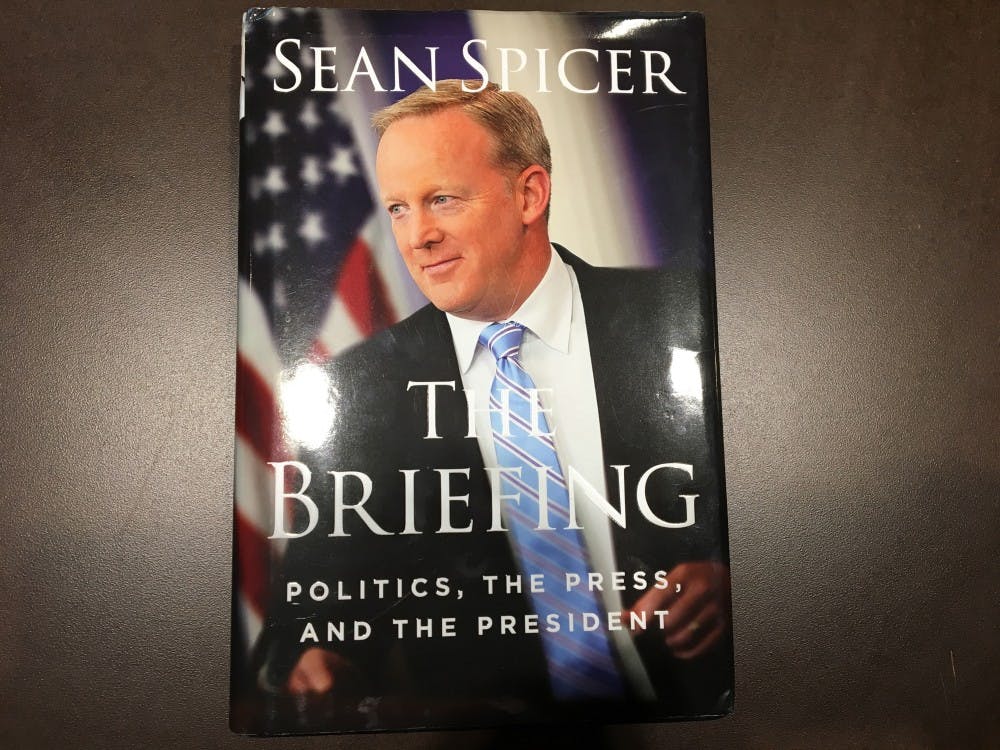Perhaps the image that most people associate with President Donald Trump’s former press secretary, Sean Spicer, is of actress Melissa McCarthy waving the White House podium at a reporter. Even Spicer had to chuckle at the "Saturday Night Live" skit, according to his new memoir, The Briefing: Politics, the Press and the President.
Spicer’s problem was that, in trying to convey the news, he became the news. Humorous and self-deprecating, Spicer pulls back the curtains to reveal the backstage of Trump White House, the wackiest show on earth.
Like any memoir though, Spicer’s starts with his childhood, detailing his middle-class Catholic childhood, his adoption of conservative values and his entrance into politics.
Spicer details his childhood, his long career as a Republican operative and his entrance to Trump's campaign. He describes a chaotic campaign operation which the Republican National Convention, for which he worked at the time, helped bring some semblance of order to.
He tells an interesting story, the highlights of which may be his persepective on various controversies. For instance, he describes why the RNC didn't lose faith after NBC leaked the 2005 Hollywood Access tape. In it, Trump infamously describes seducing a woman by grabbing “her by the p***y.”
Spicer, while expressing discomfort at Trump's language, acknowledges that Trump’s supporters simply cared less of the "locker room talk" that many considered an overly hysterical media. It's also a statement on how negatively those voters thought of Clinton.
For many people, that’s not going be a good enough explanation, but it may account for why Trump recovered.
Next, Spicer turns to his tenure as press secretary, walking through his flubs which include defense of Trump’s assertion that the inauguration day crowds were bigger than those of former president Barack Obama.
Spicer also apologizes for his grossly mistaken statement that even Hitler avoiding using chemical weapons on his people. He explains that he misspoke while trying to convey the horror of Bashar al-Assad’s use of chemical weapons, and recalled Secretary of Defense General Jim Mattis had said that even Hitler hadn’t used chemical weapons “on the battlefield.” Those last three words are critical.
Attempting to salvage his legacy, Spicer recounts instances when journalists misreported a story about him. He also said that he's proud of opening briefings to more conservatives and regional journalists, who were traditionally eschewed for outlets like the New York Times.
One of Spicer's central criticisms of the "mainstream media" is that it covers palace intrigue more than "real news" and policy initiatives. He says little to justify his effectively giving editorial advice to liberal-leaning newspapers rather than simply correcting stories they get wrong, other than tenuously citing the First Amendment (indeed, with the proliferation of online news sites, it's unclear what exactly we can count as "mainstream"). However, Spicer does admonish conservatives from denouncing the profession as a whole.
Spicer will be the first to admit that he was ill-suited for the job. A press secretary's job is to shape the news without becoming the news, and he couldn’t do that.
His post-Trump career has seen him addressing his flaws and poking fun at himself at venues such as the 2017 Emmy Award ceremony, where he spoofed his image in a surprise appearance.
Spicer's book is earnestly written and comes across as a perspective often drowned out, an establishment Republican riding the Trump train. Naturally, Spicer writes on issues facing the media, trade, taxes and more from the Trumpian perspective.
Critical readers may take issue with Spicer's undying loyalty to President Trump, his view that the First Amendment applies to the government in the same way it does to private entities and a myriad of other things. Still, this book is the first comprehensive account of the 45th presidential administration to come from within the Trump's administration. It's a quick and curious read.
More than anything, readers will understand that being Press Secretary is no frolicking picnic.
“It is an amazing job,” Spicer writes. “But it’s a lonely job that very few people have had and even fewer can appreciate in the current environment.”
Indeed, Spicer’s book urges you to appreciate a job that he made famous for all the wrong reasons.




